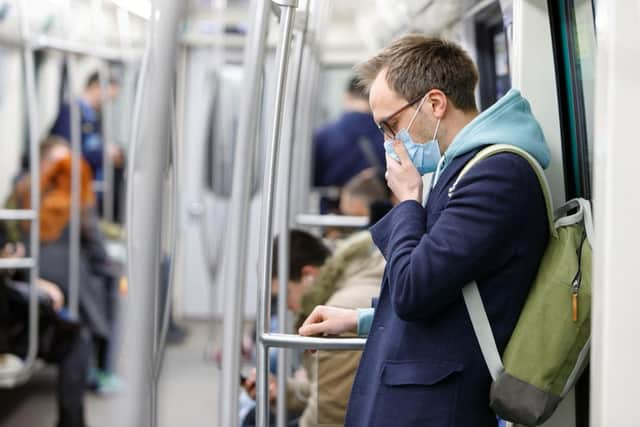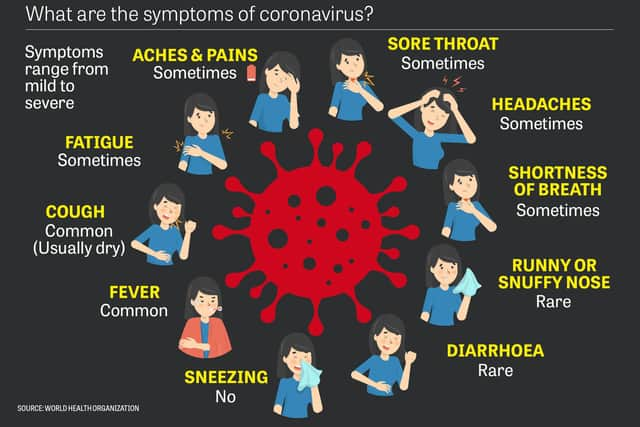What is a persistent cough and high temperature? How to spot key coronavirus symptoms - and what to do if you have them
and live on Freeview channel 276
The government’s guidelines explain that members of the public should self-isolate for seven days if they are experiencing either of the three symptoms.
Continuous cough, high fever and anosmia definitions
According to the NHS, members of the public should self-isolate for seven days if they have a new and continuous cough, a fever or anosmia.
Advertisement
Hide AdAdvertisement
Hide Ad

Public Health note that any temperature of 37.8C (100F) or more can be defined as a high temperature.
A new an continuous cough “means you've started coughing repeatedly” according to the NHS.
Anosmia is a loss or change to your sense of smell or taste.
What should I do if I or someone in my household suffer from either symptom?
Advertisement
Hide AdAdvertisement
Hide Ad

Public Health England have recommended that anyone suffering with either symptoms take the following steps:
- if you live with others and you or one of them have symptoms of coronavirus, then all household members must stay at home and not leave the house for 14 days. The 14-day period starts from the day when the first person in the house became ill
- it is likely that people living within a household will infect each other or be infected already. Staying at home for 14 days will greatly reduce the overall amount of infection the household could pass on to others in the community
- for anyone in the household who starts displaying symptoms, they need to stay at home for 7 days from when the symptoms appeared, regardless of what day they are on in the original 14 day isolation period. (See ending isolation section below for more information
Advertisement
Hide AdAdvertisement
Hide Ad- if you can, move any vulnerable individuals (such as the elderly and those with underlying health conditions) out of your home, to stay with friends or family for the duration of the home isolation period
- if you cannot move vulnerable people out of your home, stay away from them as much as possible
- if you have coronavirus symptoms: do not go to a GP surgery, pharmacy or hospital, you do not need to contact 111 to tell them you’re staying at home, testing for coronavirus is not needed if you’re staying at home
- plan ahead and ask others for help to ensure that you can successfully stay at home and consider what can be done for vulnerable people in the household
Advertisement
Hide AdAdvertisement
Hide Ad- ask your employer, friends and family to help you to get the things you need to stay at home
- wash your hands regularly for 20 seconds, each time using soap and water, or use hand sanitiser
- if you feel you cannot cope with your symptoms at home, or your condition gets worse, or your symptoms do not get better after 7 days, then use the NHS 111 online coronavirus service. If you do not have internet access, call NHS 111. For a medical emergency dial 999
When can I stop self-isolating?
You should self-isolate for at least 10 days if:
- you have symptoms of coronavirus and you tested positive, had an unclear result or did not have a test
- you tested positive but have not had symptoms
Advertisement
Hide AdAdvertisement
Hide Ad- If you have symptoms, the 10 days starts from when they started.
- If you have not had symptoms, the 10 days starts from when you had the test. But if you get symptoms after your test, self-isolate for a further 10 days from when your symptoms start.
Stop self-isolating after 10 days if you feel OK
You can stop self-isolating after 10 days if either:
- you do not have any symptoms
- you just have a cough or changes to your sense of smell or taste – these can last for weeks after the infection has gone
- Keep self-isolating if you feel unwell
- Keep self-isolating if you have any of these symptoms after 10 days:
- a high temperature or feeling hot and shivery
- a runny nose or sneezing
- feeling or being sick
- diarrhoea